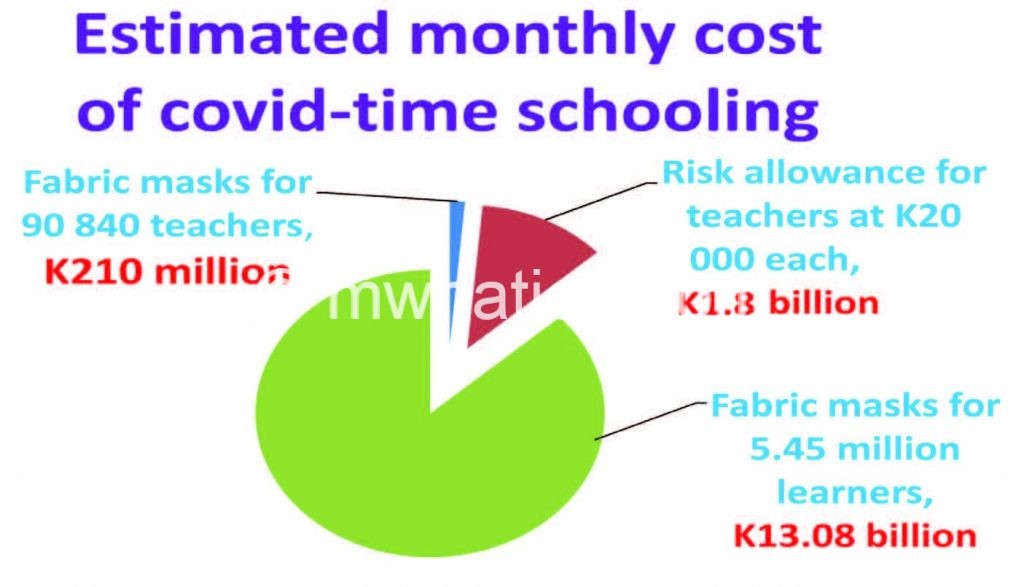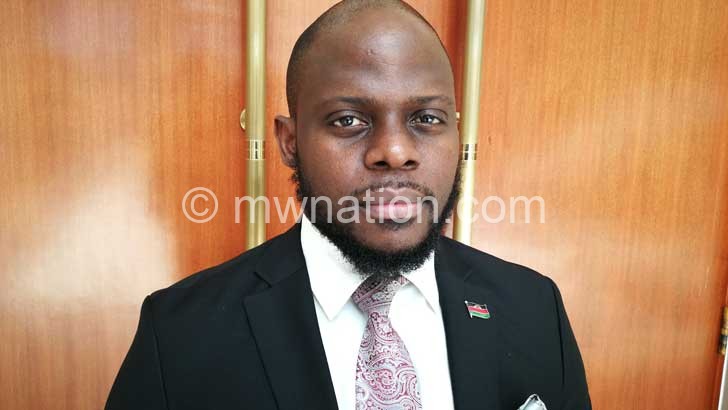How much it could take
The planned reopening of schools in early September as indicated by President Lazarus Chakwera could cost the economy tens of billions monthly if our calculations based on experts’ requirements are anything to go by.
Besides risk allowances for teachers, experts have mentioned costs for other requirements including personal protective equipment (PPE), sanitisers, soap, water bills, buckets and overtime payments as teachers will be working more hours due to shifts to catch up after schools closed in March in the face of the coronavirus pandemic.

Based on the requirements, our rough calculations show that government will have to raise up to K15.117 billion monthly for allowances and face masks for both teachers and learners if schools reopen.
In the 2019/20 fiscal year, education was allocated K172 billion, meaning the monthly expenditure stood at K14.4 bilion.
But Treasury has said there was no official figure yet on how much money would be needed for the exercise.
Teachers Union of Malawi secretary general Charles Kumchenga said they are discussing with government on the right amount for the allowances.
“We are still in discussion with government on the matter and it would not be good for me to mention how much we’re looking for. It would not do our engagement well with government,” he said.
But in an earlier interview, Kumchenga was quoted as having said the teachers wanted risk allowances similar to what healthcare workers get. He also said they would want government to provide them with PPE.
Health workers receive risk allowances ranging between K20 000 and K60 000 monthly, depending on their grades.

There are more than 90 000 teachers in Malawi—76 442 in primary schools and 1 4398 in secondary schools—according to the 2017/18 Annual Education Statistics Bulletin.
Given the stated figures, if all of the 90 840 teachers were given the conservative K20 000 monthly risk allowance across the board that the lowest health worker gets, government would be spending K1.8 billion per month on teachers alone.
On masks, the Society of Medical Doctors president Victor Mithi said if government proceeded to reopen schools, two fabric (cloth) masks would have to be provided each week to teachers and their learners.
If teachers were to be given two fabric masks per week, being sold at K300 each, every teacher would be using K600 per week, translating to K54.5 million weekly and K218 million monthly.
In 2018, total public primary school enrolment stood at 5 063 917 while in secondary schools there were 387 569 students.
Thus, giving two masks to each of the 5 451 486 learners weekly would cost government K3.27 billion per week and K13.08 billion a month.
These figures totaling over K15 billion for masks and risk allowances exclude what government would be spending on water bills due to regular hand-washing, soap and sanitisers.
In an interview yesterday, Secretary to the Treasury Chancy Simwaka said it would be difficult to determine the pressure on the economy at the moment.
He said: “There is no figure yet at Treasury on the matter, as such, it would be difficult to determine the pressure that the reopening of schools may bring to the economy.”
Earlier, Ministry of Education Principal Secretary Chikondano Mussa said all decisions made will be communicated once government is ready.
She said: “Those issues are under discussion. As you may have picked it that these issues were [raised] some time back, so, they are still under discussion [within the ministry] and a decision is yet to be made.”
The Malawi National Examinations Board (Maneb), through spokesperson Mayamiko Chiwaya, said they are engaging government on how national examinations would be administered, as more resources are required.
She said: “Let us wait for the Ministry of Education to elaborate how things will shape up and then we can respond to the questions accordingly. Yes, we are in discussion with it as our mother ministry.”
In a separate interview, Civil Society Education Coalition (Csec) executive director Benedicto Kondowe said with local transmission high, there is need to ensure that schools reopen gradually.
He said the gradual reopening would allow institutions to implement the measures and assess their effectiveness, but also remedy the gaps so that safety of students is not compromised.
Said Kondowe: “Government must be clear about the mode of re-opening. Of particular importance is that there should be concrete commitment from government to support the schools with PPE.
“However, parents based on their individual capacity should also be sensitised to play their responsibility to procure PPE for their wards. The marginalised groups should be supported under different schemes of social protection.”
He said proper avenues should be created to engage with parents and all relevant stakeholders regarding their different roles and responsibilities.
On his part, Limbani Nsapato, an education rights activist, took to his Facebook page where hecast doubt on the possibility of the schools reopening in September as indicated by the President.
He said there were several sticky issues requiring to be addressed, top of which was financial investment.
Said Nsapato: “To ensure social distancing where we have large sizes of more than 200 students per class, there is need for double shifting and hiring of more teachers, or paying extra allowances to teachers to work extra time.
“Teachers may demand hardship or risk allowances. Therefore, government needs to allocate sufficient funds to the education sector, a minimum of 20 percent of the national budget so that schools, colleagues and universities are provided with adequate funds to purchase necessary materials and enforce Covid-19 preventive measures.”
He said government has failed in this regard as the four-month provisional budget does not have an allocation for Covid-19 response in learning institutions, making re-opening of schools a big threat.
But Independent Schools Association of Malawi (Isama) president Joseph Patel said private institutions were ready for the reopening and are just waiting for inspections in their facilities.
He said: “We were given the guidelines before reopening was scheduled for July 13, and our schools made necessary preparations.
“We need to reopen schools because it will help the economy. Pupils will be buying books, and other learning materials. So for us, we are ready, come September, schools will reopen, implementing all measures.”
When government wanted to re-open schools on July 13, the National Planning Task Force to coordinate the management of Covid-19 in the education sector proposed that safe return to schools be managed through a phased approach and not all at once.
Reads the recommendations in part: “The ministry is working on specific figures that will cover an initial three months period where all teachers will qualify for a risk allowance at the same rate as health workers.
“This will avoid industrial action and missing of classes by teachers on what will be valid fears without mitigating factors. The task force further wishes to state that all schools will be required to provide teachers with necessary protective materials usable in classes and the learning environment.”
Among some of the guidelines the Ministry of Education has put in place are a preparedness checklist for schools to facilitate the reopening, including disinfection of schools before reopening and availability of water, soap and hand sanitisers at entrance to classrooms, toilets, dining areas, libraries, hostels and administration offices.
The guidelines also indicate an engagement of stakeholders on reopening plans, health protocols and strategies to ensure safety and learning, as well as orientation of teachers on remedial education strategies on health, hygiene and psychosocial support for learners.
In addition, the guidelines also indicate that the Ministry of Health, through district health and district environmental health officers, will ensure periodic disinfections and preventive protocols are followed. They will also ensure learners are oriented and that schools cancel assemblies and other crowded events.
Government directed that schools should close on March 23 this year as a Covid-19 preventive measure. On April 2, Malawi registered its first three Covid-19 cases, which escalated to 5 125 by Monday.





